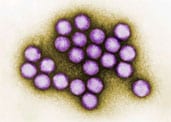At a glance
- Adenoviruses are common viruses that typically cause mild cold- or flu-like illness.
- Adenoviruses can cause illness in people of all ages any time of year.
- People with weakened immune systems (including from medications they are taking) or who have cardiac or respiratory diseases are at higher risk for developing severe adenovirus infection.

Clinical features
Adenoviruses most commonly cause respiratory illness. The illnesses can range from the common cold to pneumonia, croup, and bronchitis. Depending on the type, adenoviruses can cause other illnesses such as gastroenteritis, conjunctivitis, cystitis, and, less commonly, neurological disease.
Adenovirus infections can be asymptomatic. Even if a person has an adenovirus infection, it does not necessarily mean it is causing the person's particular illness. Also, some people, especially those who have weakened immune systems, can shed the virus for weeks or longer and not have symptoms.
Prevention
To prevent healthcare-associated outbreaks of adenovirus infections, health care providers should follow the Isolation Precautions Guideline based on the clinical syndrome exhibited by the patient.
For suspected respiratory illness caused by adenovirus infection, healthcare providers should follow the guidelines for preventing healthcare-associated pneumonia.
Vaccination
Currently, no adenovirus vaccine is available for the general public.
A live oral vaccine against adenovirus types 4 and 7 is approved by the U.S. Food and Drug Administration only for U.S. military personnel ages 17 through 50 years who may be at higher risk for infection from these two adenovirus types. The vaccine is recommended by the U.S. Department of Defense for military recruits entering basic training in order to prevent acute respiratory disease. It may also be recommended for other military personnel at high risk for adenovirus infection.
For more information about the vaccine, see Adenovirus Vaccine Information Statement (VIS).
Use of disinfectants
Adenoviruses are resistant to many common disinfectants and can remain infectious for hours on environmental surfaces and medical instruments.
To prevent spread of adenoviruses from surfaces, use an EPA-registered disinfectant that is effective at killing adenoviruses and compatible with the surfaces and equipment being used.
Disinfectants effective against norovirus are also effective against adenoviruses. See EPA List G for these disinfectants.
For more information on infection prevention and disinfection, see:
Testing and diagnosis
Health professionals should:
- Consider adenoviruses as possible causes of upper respiratory infection, lower respiratory infection (such as pneumonia), conjunctivitis (individual cases or outbreaks), and gastroenteritis.
- Report clusters of possible adenovirus infections (e.g., respiratory infections, conjunctivitis) to the state or local health department in the area.
Methods for testing and typing:
- Adenovirus infections can be identified in the clinical setting using antigen detection or polymerase chain reaction (PCR) testing.
- Adenovirus PCR testing is most commonly accessible to clinicians by using a multipathogen PCR test (i.e., a PCR test that can test a single respiratory or stool specimen for adenovirus and many other common respiratory or enteric pathogens).
- Virus culture can also be used to diagnose adenovirus infections, but these tests are typically reserved for epidemiologic investigations and are less commonly used in clinical settings.
- Adenovirus (geno)typing is possible and usually done by molecular methods (i.e., full or partial genomic sequencing).
Clinical guidance for testing
Get clinical guidance for adenovirus nucleic acid amplification tests (NAATs), including polymerase chain reaction (PCR), and possible additional testing.
Treatment and recovery
There is no specific treatment for people with adenovirus infection. Most adenovirus infections are mild and do not require any medical care.
Clinical care of adenovirus infections includes treatment of symptoms and complications. There are no FDA-approved antiviral drugs for adenovirus treatment. For people who are hospitalized with severe adenovirus infection, consultation with an infectious disease expert is recommended.
Risk
People with weakened immune systems are at high risk for developing severe illness caused by adenovirus infection. Some people infected with adenoviruses, especially those who have weakened immune systems, can have ongoing infections in their tonsils, adenoids, and intestines that do not cause symptoms. They can shed the virus for weeks or longer.
Resources
Adenovirus-associated epidemic keratoconjunctivitis outbreaks — four states, 2008–2010. MMWR. 2013;62(32);637-41.
